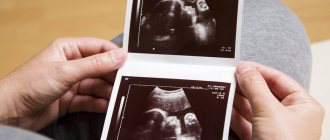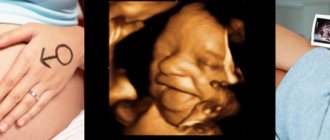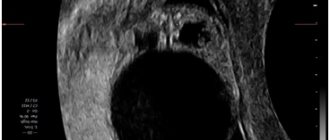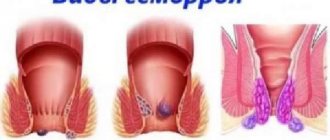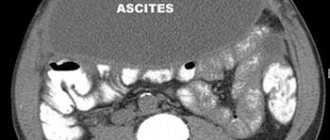During pregnancy, a woman closely monitors changes in her health. The appearance of new symptoms prompts you to think and find out their cause. If diarrhea appears at 39 weeks of pregnancy, you need to understand why. Is this symptom a sign of impending labor or infection? When is it better to go straight to the maternity hospital, and when to invite a doctor to your home?
What's happening
Now the baby’s body is actively preparing for existence outside the mother’s tummy. The heart, kidneys, and lungs are already capable of supporting the life of a newborn. The intestine has become completely passable, and its muscles are slowly moving into the lower sections of the meconium.
The improvement processes will not stop even after the baby is born. By 39 weeks of pregnancy, the development of the central nervous system has not been completed, and although the sucking apparatus is functioning, the muscles will become even stronger, because the child will have to “get” his own food. Due to lack of training, the salivary glands and chewing apparatus are not yet developed. Saliva will begin to be produced only a month after birth, and the baby will learn to chew when the time comes.
At the 39th week of pregnancy, the length of the fetus is usually from 51 to 52 cm, and the weight is 3250 - 3300 g. It has a rather large head, and the shoulder girdle and chest are now better developed than the girdle of the lower extremities. In the remaining time, the baby grows due to lengthening of the torso and legs.
The child spends 16–20 hours a day sleeping, gaining strength before childbirth. And when he’s awake, mom clearly feels his movements. You have already noticed that there are fewer movements, but, like last week, there should be at least 10 of them per day.
By the 38th – 39th week of pregnancy, the placenta ceases to cope with its functions. Aging is a physiological phenomenon associated with tissue thinning, metabolic slowdown, and deterioration of blood supply. The fetus receives less and less oxygen and nutrients.
Position of the baby in the uterus
By this time the child had taken his final position. There is not enough room for him in the uterus, so the fetus’s legs are pressed to the stomach and the arms are folded on the chest. This is the most suitable position for the easiest passage through the birth canal. In 95% of cases, the baby's head is pressed against the pelvis.
Sometimes the baby may be in a breech position. There is no need to panic about this, since it will be possible to give birth naturally, without harming the health of the woman or baby. If the doctor suspects any threat, a caesarean section will be performed.
All women whose baby is in a breech position are sent to the maternity hospital even before labor begins. There, a control ultrasound is performed, during which the size of the child is assessed, its location is clarified and the method of delivery is determined.
How you feel
The body is ready for childbirth, and there are practically no significant changes in your sensations. At 39 weeks pregnant, you may still experience itchy skin on your belly. Discomfort in the lower back and sacrum sometimes increases, and due to the strong pressure of the uterus on the bladder, the expectant mother is often bothered by pain in the perineum. In addition, due to the production of colostrum at this time, pain in the chest may appear.
Training contractions at the 39th week of pregnancy are observed more often, but their duration remains the same. You may now find that your weight has decreased. Don't worry: this is normal in later stages. Due to the fact that the body is freed from excess fluid, a woman can lose up to 2 kg. The intestines are also cleansed, which is why diarrhea is possible at this stage.
It is not uncommon for nausea caused by late toxicosis to appear in the 38th – 39th week of pregnancy. This condition is dangerous for the expectant mother and baby, and you must tell your doctor about this symptom. And to make your well-being easier, spend more time in the fresh air, increase the number of meals and reduce the size of portions. Try not to lie down immediately after eating to avoid possible vomiting.
If your stomach feels stiff, this may be a sign of hypertension. Consult a gynecologist - usually the doctor in such cases prescribes an antispasmodic drug.
Now it is important to monitor vaginal discharge: normally it is light milky, of uniform consistency, with a slightly sour odor. At 39 weeks of pregnancy, you should not be afraid of a slight increase in their number, as well as the presence of mucus. These are nothing more than particles of a plug that closes the entrance to the cervix. But purulent, flaky or curdled discharge of an unusual color is a reason to consult a doctor, since these are symptoms of genital infections, and while there is still time, you need to undergo treatment.
Go to the doctor immediately if you notice watery, yellowish discharge at 38–39 weeks of pregnancy. This is the release of amniotic fluid. Amniotic fluid does not always come out right away. If the integrity of the membranes is damaged, it can come out in small portions, which is bad for the baby, because he becomes very vulnerable to infections. Call an ambulance immediately if there is blood coming from the genital tract. Perhaps premature placental abruption has begun.
Methods of pain relief during childbirth
Perhaps what women fear most is the severe pain that accompanies the process of childbirth. Therefore, the question of pain relief often arises.
Occasionally, epidural or epidural anesthesia is used during vaginal birth. In this case, the lower part of the body becomes insensitive, the muscles relax, but the cervix continues to dilate. Anesthesia helps to lengthen pushing. Indications for pain relief are cardiovascular disease in a woman, slow dilatation of the uterus, or an extremely low threshold for pain sensitivity.
Anesthesia is also performed when it is necessary to begin an emergency operation. It is important to understand that anesthesia for a child is dangerous due to side effects, therefore anesthesia is not performed only to reduce labor pain.
Medical observation
At the 39th week of pregnancy, a visit to the gynecologist is scheduled. The specialist will listen to the baby’s heartbeat, check the readiness of the cervix for childbirth and perform other standard procedures:
- Blood pressure measurement;
- Weighing;
- Measuring the height of the uterine fundus.
In addition, as usual, urine and blood tests need to be done.
At 39 weeks of pregnancy, ultrasound is usually not done. However, there may be individual indications for repeating it. As before, during an ultrasound examination, the doctor examines the fetus, determines its physical parameters and degree of development. The size and condition of the uterus, the degree of maturity of the cervix, and the quantity and quality of amniotic fluid must be assessed. An important criterion is the degree of maturity of the placenta (most often at this stage it is the third).
An ultrasound will also give an idea of how the umbilical cord is positioned. Sometimes a single, double or multiple entanglement of the fetal neck is detected. During pregnancy, this is usually not dangerous because inside the mother's womb the baby does not breathe through the lungs, and oxygen reaches it through the blood. Difficulties arise when the entanglement is very tight, since this disrupts the normal blood supply to the fetus. Such pathologies require close attention from a gynecologist, but in most cases (if the umbilical cord is of normal length and does not tighten the neck), a healthy child is safely born naturally. And only if problems arise in the first stage of labor, an emergency caesarean section is performed.
Hemorrhoids at 39 weeks of pregnancy
This unpleasant disease occurs due to the fact that the uterus increases in size and begins to put pressure on the pelvic floor and venous plexus. It doesn't happen to everyone.
Hemorrhoids usually appear at the end of the third trimester, but can appear earlier, from about 21 weeks . Hemorrhoids also cause constipation, which often occurs in pregnant women.
The age of the expectant mother has a significant influence. Those who become pregnant at 22-24 years of age have several times less chance of getting an unpleasant disease than those who become pregnant at 29-30 years of age.
At the first appearance of symptoms of hemorrhoids, you should immediately contact your gynecologist. With timely and proper treatment, hemorrhoids will go away in less than a week, and the painful sensations will leave you on the second day.
Recommendations
Be outdoors every day to ensure your baby gets enough oxygen. To get rid of pain, do breathing exercises, and if your health allows, continue to do gymnastics for pregnant women.
In the final stages, do not stop monitoring your diet. By the end of the 38th - 39th week of pregnancy, the uterus has dropped, therefore, most likely, your appetite has awakened, but try not to overeat so as not to overload the body before childbirth. The daily menu should contain foods with sufficient amounts of protein: fish, porridge, cottage cheese, kefir, yogurt. Now you also need carbohydrates. To maintain energy, you can indulge in desserts, but give preference to natural products without harmful artificial fillers. Don’t forget about fiber: your table should have vegetables, fruits, and wholemeal products.
At 38–39 weeks of pregnancy, many expectant mothers are overcome by “nesting syndrome.” I want to start a renovation or at least rearrange it, buy new things and solve a whole bunch of other problems. Before you do anything big, think it through. Due to emotional imbalance, what you like today may begin to irritate you tomorrow. Model the future appearance of the interior on the computer, consult with the designer and only then get down to business. Don’t overestimate your physical capabilities: let specialists, friends or relatives do all the work.
When shopping at 39 weeks pregnant, remember that babies grow very quickly, and you may end up with a lot of unused items. Buy only the essentials, and prepare a list for your friends and family - then they won’t have to rack their brains about what to give you.
As for intimate relationships at the 39th week of pregnancy, if you feel great and there are no medical contraindications, you should not deny yourself pleasure. Sex cannot harm the fetus, as it is protected by a mucus plug. And amniotic fluid protects against shocks. Sexual intimacy has a positive effect on the cervix: under the influence of sperm it softens, and this is useful for childbirth. But we must not forget about caution, because contractions can begin at any moment.
Treatment
Under no circumstances should you treat loose stools at 40 weeks on your own. To eliminate diarrhea, you must first determine the cause of its occurrence. Only a specialist can establish a diagnosis and prescribe appropriate treatment:
- If frequent bowel movements are preceded by digestive diseases, you will need a certain diet and split meals.
- In case of nervous shock, sedative medications will help eliminate diarrhea. Herbal preparations are prescribed for pregnant women.
- In case of intestinal infection, a pregnant woman cannot do without antibiotics; less gentle means are selected.
- When watery stool occurs due to food poisoning, absorbents will be needed. They help in a short time to remove harmful substances from the body that pose a threat to the child’s life.
We recommend: What does yellow diarrhea mean in an adult?
It is very important to drink plenty of fluids when you have bowel movements to avoid dehydration. Adjust your diet, exclude fatty, fried, spicy foods, smoked foods, fresh fruits and vegetables.


